- Home
- Jane Peart
A Tangled Web Page 6
A Tangled Web Read online
Page 6
She was better off without him. He didn’t deserve her loyalty. Or the truth about where she was and what she was doing. Let him wonder and worry and miss her. It served him right.
He was probably on the campaign trail now and loving every minute. And she? Well, her new life was just as different and interesting and full of unexpected rewards. Except for the troubling undercurrent that she was living a lie in relation to her family and the people in Willowdale, Darcy found she was happier than she ever thought she could be.
In spite of all the Harvey rules and regulations, Darcy was experiencing a sense of freedom as delicious as it was strange.
The Harvey system was a strict teacher. However, Darcy was learning a great deal from this experience. She was becoming more responsible, more punctual, more attentive to details, and learning to get along with all sorts of people. In the Harvey system, everyone was treated the same no matter what their job was—chefs, busboys, waitresses. All work was honorable and respected. There was no acceptable excuse not to follow directions, cooperate, be generous and helpful. It was character building, and surprisingly Darcy really liked how she was changing.
TEN
DECEMBER 1903
Although Christmas was coming and thoughts of home and family were often in Darcy’s mind, it didn’t seem a good time to write an explanatory letter to her family. Why spoil Christmas with news that would upset them? With her salary and generous tips, Darcy had accumulated a nice little nest egg. She spent a good part of it buying extravagant presents for each member of her family and enclosed in the package she sent home an ambiguous description of the holidays she was enjoying. She used the Harvey House special holiday menu to describe the festive meal she would be sharing with friends. That much was true. Since there weren’t many travelers on Christmas Eve or Christmas, the staff was treated to a gourmet feast of the best of the restaurant’s cuisine.
Dear Family,
I am sure you will be happy to know that Christmas is celebrated out west much as it is in Willowdale. Of course, I shall miss Auntie Sadie and Aunt Maude’s sweet potato pies. But there are some marvelous cooks here too. There will be the traditional turkey, of course, all sorts of relishes and vegetables.
Darcy did not dare put in some of the chefs’ prize dishes which would also be served to show off their skills. She had some qualms of conscience as she wrote. She soon dismissed them. Who was it really hurting? She never actually lied. And who would ever know?
The fact that she herself knew was bad enough. She squirmed uncomfortably when Clemmie said her church was putting on a Christmas pageant with a special music program, and invited her to come. Going to church seemed hypocritical under the circumstances, but Darcy saw no way to avoid it.
After they had finished dinner service, cleaned their station, and set up their tables for breakfast, Clemmie and Darcy hurried back to their room to dress and leave for church.
The little church was beautifully decorated, and as Clemmie had assured her, hearing the choir sing was like listening to a band of angels. Darcy found herself remembering other Christmases when she had attended church with her family. Sometimes she had been inattentive, day-dreaming perhaps of a new dress she was wearing or a holiday party she was going to the next evening. But this night everything about the service seemed especially lovely and meaningful. She was more appreciative of the true reason, more mindful of whose birthday they were celebrating.
Darcy particularly liked the simplicity of the minister’s sermon.
“It is Christmas, and I wish you happiness today and for every tomorrow in the new year. It is a time to rejoice and be glad for the gift of the world’s greatest life. It is time to praise God and be grateful for the daily miracles we tend to take too much for granted.”
His words lingered with her after church. As she and Clemmie walked through the starlit night back to their dormitory, Darcy had to really face what she was doing, the deception about her job. With New Year’s just around the corner, she made a resolution that at the first of the year she would write a full letter of explanation to her family.
However, the very next morning something unexpected happened to change the direction of her life. She and Clemmie were called into the manager’s office and told that two vacancies had occurred and that they were being transferred to the restaurant at the newly established Harvey House hotel in Redsands, Arizona. They were given railroad passes and told to pack up immediately because they would be leaving the next day on the morning train.
Both girls were thrilled. What an adventure lay ahead! They had heard how beautiful Arizona was and that the Harvey House there was one of the most elegant on the whole Santa Fe line and welcomed the most glamorous guests.
That night in a frenzy of excitement Darcy packed. As she did, she came across the box containing her engagement ring, where she had stuffed it in the pocket of her valise. Why she had kept it instead of sending it back to Grady, she wasn’t sure. Now that she was starting a new job in a new town, a whole new set of experiences awaited her. This seemed the time to cut the last tie that bound her. So much had happened since she broke up with Grady, left Willowdale. So much had changed for her and in her. She wondered if she had ever really been in love with him. Or had she just been in love with being in love? She certainly hadn’t given much thought to the duties, the responsibilities, of marriage, the commitment to another person’s welfare and happiness. For that matter, had she even understood what they were?
The only thing she had known for sure was that she didn’t want to live the life Grady had chosen for himself. A sheriff’s wife? No, Darcy knew that wasn’t for her. She replaced the little box in her valise and went on packing. When she got to Redsands and was settled in there, she would write Grady a letter and return the ring. Mentally she worded it.
Dear Grady,
I am returning your ring. No matter what you said about not wanting to be unengaged, it is for the best. We were not meant for each other. I hope someday you will find a girl who is more suited to the kind of life you want.
With sincere good wishes…
That should once and for all leave no doubt that she meant it. It might sound stiff and cold, but what else could she say? It seemed she had already said it all in the talks they’d had before she left Willowdale. Besides, a returned engagement ring would probably not cause half so much gossip as the truth she was hiding.
She would write to both her family and Grady from Arizona. She could only imagine what kind of reaction would be in the next batch of mail from Willowdale.
PART THREE
ELEVEN
As soon as Darcy and Clemmie got off the train in Arizona, they exchanged happy smiles. It was like stepping onto an entirely different planet. The sunshine, the warm breeze, the mild climate, the Indians camped at the depot, selling their wares of pottery and woven rugs and blankets, the mountains visible behind the Harvey House hotel—all seemed strange and exotic.
The hotel was built in the style of a Spanish hacienda, with stucco over adobe brick, a red tile roof, long arched porches, and a center courtyard surrounded by colorful flower beds. In the middle of the courtyard stood a circular fountain. Inside the hotel were seventy-five guest rooms, plus parlors, a barbershop, a club, a reading room, and the dining room.
Between the hotel and the train station was a two-hundred-foot arcade, like a mission cloister, leading to the museum and gift shop featuring Indian arts and crafts. Inside were rooms where tourists could watch weavers, potters, silversmiths, bead makers, and basket makers at work.
The Harvey House hotel and restaurant, with its excellent cuisine and service, its romantic atmosphere, was also the social center of the town. Civic and private events such as wedding receptions and banquets of various kinds were held here. Its attractive furnishings, with much use of the native art, rugs, pottery, drew a wide clientele. Outside the dining room, a brick patio with a fountain and abundant flowers had tables at which patrons could visit and socia
lize before coming inside to eat.
The Harvey House code was so well established throughout the system that Clemmie and Darcy had no trouble fitting easily into their new assignment. The same rules and regulations, the same pattern of serving, were in effect here as in all the other Harvey House restaurants.
Swept up into the excitement of her beautiful new surroundings, Darcy put off writing the letter to her family. Instead she sent a telegram with a few lines simply stating,
A new job opportunity presented itself, and I decided to take it. I will write soon.
Somehow the dramatic step of writing to Grady and returning his ring faded in importance. In the enjoyment of her new everyday life, filled with new sights, experiences, she never got around to doing it.
She sent many picture postcards of the area: colorful images of the picturesque town, its unusual architecture, the flowers, and the local Native Americans in their colorful garb. This seemed to her to offset the need for details about her job. She had read Helen Hunt Jackson’s novel Ramona and not only had been enchanted by the romance but also had developed a sympathy for Native Americans. She was fascinated by their jewelry-making skills, their intricately designed woven rugs and blankets, and their original pottery with its unique painted motifs.
Darcy justified her lack of candor by assuring herself there was no real lie in anything she wrote. Except of course the insinuation that she was working as a teacher. She still winced, picturing the reaction of her relatives if the truth were known. It had gone on for months now, and the situation seemed too complicated. Somehow Darcy didn’t know how to untangle it all.
Midwinter in Arizona brought a flock of travelers into the restaurant. The clientele was interesting. Many came from the North and East, seeking the warmth of the climate, the scenic beauty of the area, and the chance to view another way of life, as demonstrated by the Native Americans, whose traditions were the same as they had been for hundreds of years before the white man came.
Darcy loved her new assignment. Among the train passengers who came and stayed for periods of time at the adjoining hotel were some whose names were seen on theater marquees, on best-selling books, on the national political scene. Actors, artists, writers—the affluent and influential from all walks of life. These people, most of them seeking anonymity, enjoyed being unrecognized, so they could relax. Harvey Girls were taught to treat everyone the same regardless of their celebrity.
That’s why the arrival of the Edistons, a U.S. senator and his wife placed at Darcy’s station, was not handled as a special event.
Congress was in recess, and this was the couple’s usual time to take an Arizona vacation. As she served them at every meal, Darcy learned they came every year.
Elizabeth Ediston was Darcy’s idea of a lady of refinement—tall, willowy, dressed in the best of taste. Her hair, always beautifully coifed, was a silvery blond, her features aristocratic. Her manner was reserved. She spoke in a low voice, never asked for any special service, and always left a generous tip.
Roger Ediston was the total opposite. He was gregarious and outgoing. In appearance he looked just like a senator should, portly with flowing silver hair and a well-trimmed mustache. He was openly cordial, had a smile for everyone, staff and fellow hotel guests alike. Upon entering the dining room, he would stop at various tables, seeming to recognize people, to shake hands or give someone a pat on the shoulder. In a way he reminded Darcy of her uncle, who always seemed to be running for election. However, the rumor circulating through the hotel was that this would be Senator Ediston’s last term in office.
It seems the real reason for their frequent trips to Arizona was Mrs. Ediston’s frail health. This was confirmed to Darcy by Mrs. Ediston herself. The day before they were to return to Washington, D.C., she confided, “I shall miss it here, Darcy. How I dread leaving. It’s so peaceful and relaxing here, compared with all the frenzy of life in the capital.”
“We’ll be sorry to see you go, Mrs. Ediston.”
“Thank you, Darcy. You have made our mealtimes here especially pleasant. You’re such a lovely young lady. I’m sure your family must be very proud of you.”
Darcy felt a clutch of guilt. Proud of me? Not if they knew the truth! Or what a liar I am!
Mrs. Ediston continued as she sipped her tea, “The only thing that makes leaving bearable is that we will be back in the spring and eventually will be coming back to stay. We fell in love with Arizona on our first trip here, and both of us decided it would be the perfect place to retire. We had a Washington architect draw up plans for us to build a permanent home here. The architect will scout the area and select a site. When we come in the spring, we’ll make the decision.” Darcy saw Mrs. Ediston’s excited anticipation in her eyes and heard it in her voice. “While the house is under construction, we’ll be staying here as usual. So this isn’t good-bye, Darcy.”
“That’s good news. I’m so glad to hear that, Mrs. Ediston.”
When the Edistons departed on the noon train the next day, Darcy felt better knowing they would be returning.
Another Harvey House guest arrived the following day and was assigned to Darcy’s station. A direct contrast to Elizabeth Ediston, she was stocky and of indeterminate age. Her dark, wispy hair was worn in a careless bun and was threaded with silver streaks; her face was lined, suncoarsened, probably by an active outdoor life. She rode horseback every morning. She came into the dining room in her riding outfit of jodhpurs and denim jacket and ordered a hearty breakfast. The first day Darcy waited on her, she speared Darcy with a penetrating look, then announced, “I’m Clara Bingham,” as if Darcy should recognize the name. Trained that all customers of the restaurant were to be treated the same no matter who they were, Darcy showed no particular awe. The woman asked, “You’re new, aren’t you?”
Darcy smiled and answered that she was.
The next question was, “How do you like being a waitress? I should think a young woman as pretty and presumably smart as you would find a better job than waitressing.”
Darcy was indignant at this assertion. She drew herself up proudly. “I’m a Harvey Girl; that’s different.”
“No need to get huffy.” Clara seemed amused. “I’m sure it must have benefits I don’t know about. What would you say they were?” She eyed Darcy curiously.
Darcy did not answer but went on serving her, refilling her coffee cup several times. She did not initiate any more conversation. Neither did Clara Bingham.
After Miss Bingham left the dining room, Darcy realized she had actually been offended by the woman’s remark about being a waitress. She was proud of being a Harvey Girl. Now that she knew what it took to be one, she was very proud indeed.
Later when she and Clemmie were in their room taking their break between train arrivals, Darcy was glancing through her roommate’s new copy of the Ladies’ Home Gazette. Suddenly she let out a gasp and sat straight up. “Will you look at this!” She thumped a page of the magazine with her index finger. “Japan! She’s been to Japan! Lived there. This is all about her travels there!”
“What, what? Will I look at what?”
“Clara Bingham. My Clara Bingham. Right here in the Gazette!” Darcy held up the magazine, pointing to the lead article. “She’s a famous writer and she’s sitting at my station.”
Clemmie seemed unimpressed. “So? Lots of famous people come to Harvey House.”
“Maybe. But I’ve got one sitting right at my table three times a day. Well, almost three times. Breakfast and dinner, anyway.”
Intrigued by her new customer, Darcy determined to get to know Clara Bingham better. She bent the rules a little by asking her questions while serving her. The journalist was quite willing to share some of her adventures.
At each meal Clara told Darcy a little more about herself. And Darcy was impressed. Clara wrote for a large publishing chain consisting of magazines and newspapers, including some of the best-known periodicals in the country. She had been almost everywhere. Africa
, India, the Himalayas, traveling alone, under hazardous conditions, sometimes in dangerous situations. Darcy had never known anyone like her. A single, independent woman with a career. Clara was intelligent, funny, and articulate. She was clever, quick, and interested in everything.
What Darcy did not discover at the time was that on this trip, Clara was riding the entire railroad system through the Southwest, doing research for a series of travel articles featuring various places along the way. Arizona was her current area of concentration.
As the days went on, the two became friends. Darcy enjoyed waiting on Clara, hearing about her adventures, and little by little the journalist drew Darcy out about her life as a Harvey Girl.
Harvey Girls were not encouraged to enter into personal conversations with the people they served, but it seemed to Darcy that this rule hardly applied to the friendship she and Clara had developed.
One morning at breakfast Clara remarked, “People come to Arizona for different things. The reason most give when asked is that they came to find the ‘good life.’ I think that more often it’s to find themselves. What about you, Darcy? What did you come to Arizona for?”
“Maybe to find myself,” Darcy answered lightly as she filled Clara’s coffee cup.
Clara gave her a sharp look. “Really? Come now, how can a smart young woman like you find yourself waiting tables?”
“Well then, happenstance!” Darcy laughed. “A chance meeting on a train? Does that suit you better?”
“That sounds like a good story.” Clara’s sharp eyes brightened as she looked at Darcy over the rim of her cup.
“Oh, it is. You can add a broken engagement to that to make it even better.”
“Go on, I’m all ears.” Clara set her cup down and leaned forward.
“Better still,” Darcy said, smiling mischievously, “my job is a well-kept secret.” She lowered her voice. “I’m supposed to be teaching school. My family would have a fit if they knew I was working as a waitress.” She paused. “But I love it. I’ve never been happier. Being a Harvey Girl is the best.”

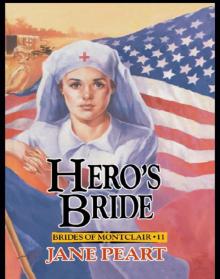 Hero's Bride
Hero's Bride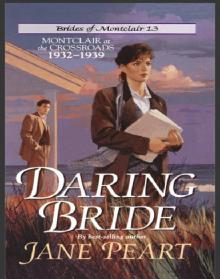 Daring Bride
Daring Bride Runaway Heart
Runaway Heart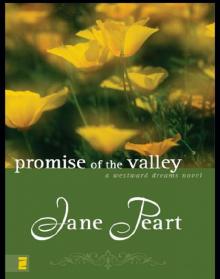 Promise of the Valley
Promise of the Valley Gallant Bride
Gallant Bride The Pledge, Value
The Pledge, Value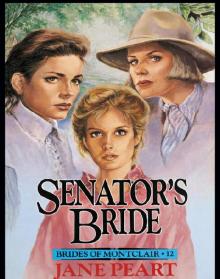 Senator's Bride
Senator's Bride Valiant Bride
Valiant Bride Shadow Bride
Shadow Bride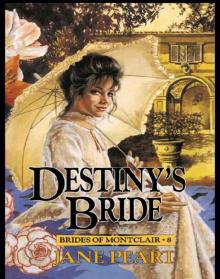 Destiny's Bride
Destiny's Bride A Tangled Web
A Tangled Web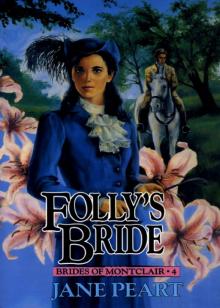 Folly's Bride
Folly's Bride The Promise
The Promise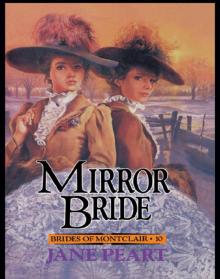 Mirror Bride
Mirror Bride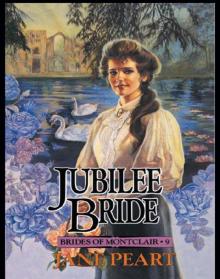 Jubilee Bride
Jubilee Bride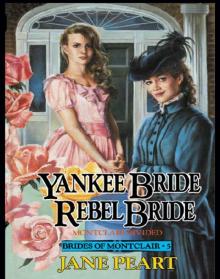 Yankee Bride / Rebel Bride
Yankee Bride / Rebel Bride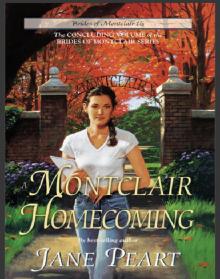 A Montclair Homecoming
A Montclair Homecoming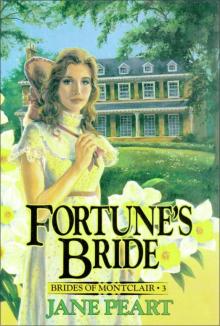 Fortune's Bride
Fortune's Bride Undaunted Spirit
Undaunted Spirit Love Takes Flight
Love Takes Flight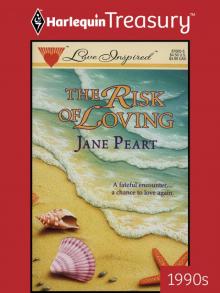 The Risk of Loving
The Risk of Loving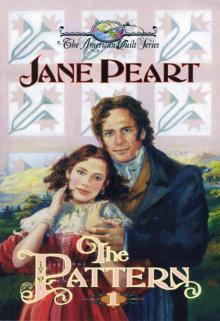 The Pattern
The Pattern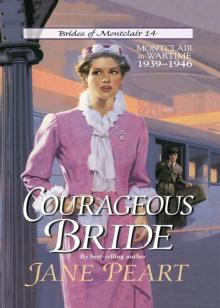 Courageous Bride
Courageous Bride